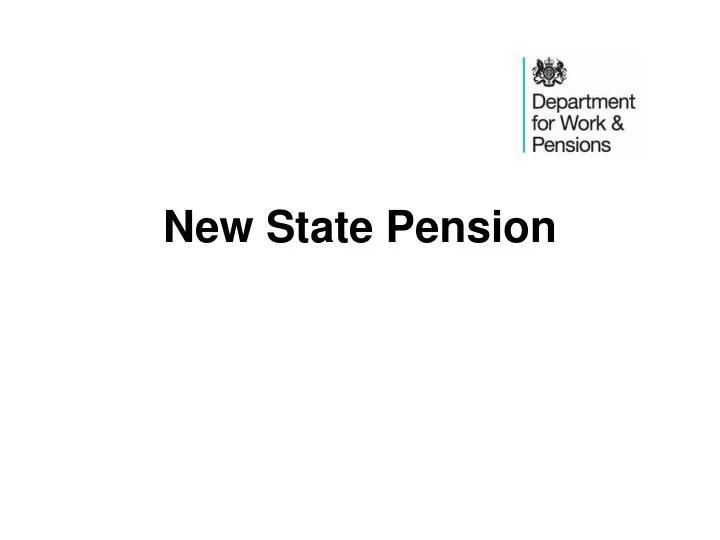

New State Pension
The new State Pension will effect those reaching State Pension age on or after 6 April 2016 The new State Pension will replace the current State Pension scheme. You’ll get your State Pension under the current scheme if you reach State Pension age before 6 April 2016.
You’ll be able to claim the new State Pension when you reach State Pension Age if you are: • a man born on or after 6 April 1951 • a woman born on or after 6 April 1953 The full new State Pension will be no less than £148.40 per week. The actual amount will be set in autumn 2015.
Your National Insurance record before 6 April 2016 is used to calculate your ‘starting amount’. This is part of your new State Pension. Your starting amount will be the higher of either: • the amount you would get under the current State Pension rules (which includes basic State Pension and Additional State Pension) • the amount you would get if the new State Pension had been in place at the start of your working life
If your starting amount is less than the full new State Pension You may be able to get more State Pension by adding more qualifying years on your National Insurance record after 5 April 2016 (until you reach the full new State Pension amount or reach State Pension age - whichever is first). Each qualifying year on your National Insurance record after 5 April 2016 will add about £4.24 a week (which is £148.40 divided by 35) to your new State Pension.
Your starting amount may include a deduction if you were in certain: earnings-related pension schemes at work (e.g. a final salary or career average pension) before 6 April 2016 workplace, personal or stakeholder pensions before 6 April 2012 You may have paid lower National Insurance contributions and paid into one of these pensions instead. This is known as being ‘contracted out’ of the Additional State Pension.
Your new State Pension is based on your National Insurance record when you reach State Pension age. You’ll usually need to have 10 qualifying years on your National Insurance record to get any new State Pension. You may get less than the new full State Pension if you were contracted out before 6 April 2016. You may get more than the new full State Pension if you have over a certain amount of Additional State Pension. You’ll need 35 qualifying years to get the new full State Pension if you don’t have a National Insurance record before 6 April 2016. .
The new State Pension is based on your own National Insurance record. However, you might be able to increase your new State Pension if you’re a woman and paid married women’s and widows Reduced Rate contributions. From October 2015 to April 2017 State Pension entitlement can be topped up if you have reached State Pension age, or will do so before 6 th April 2016 This top up could be as much as £25-00 per week if paid in a lump sum.
• The new pension will be based on individual qualification, without the facility to inherit or derive entitlement to the State Pension from the National Insurance record of a spouse or civil partner (although there will be some limited transitional arrangements). It will continue to allow people to defer (put off) claiming their State Pension and receive a higher weekly State Pension in return. • The deferral rate will be finalised closer to implementation. It will no longer be possible to receive deferred State Pension as a lump-sum payment.
New State Pension https://www.gov.uk/new-state-pension State Pension Calculator https://www.gov.uk/calculate-state-pension
Recommend
More recommend